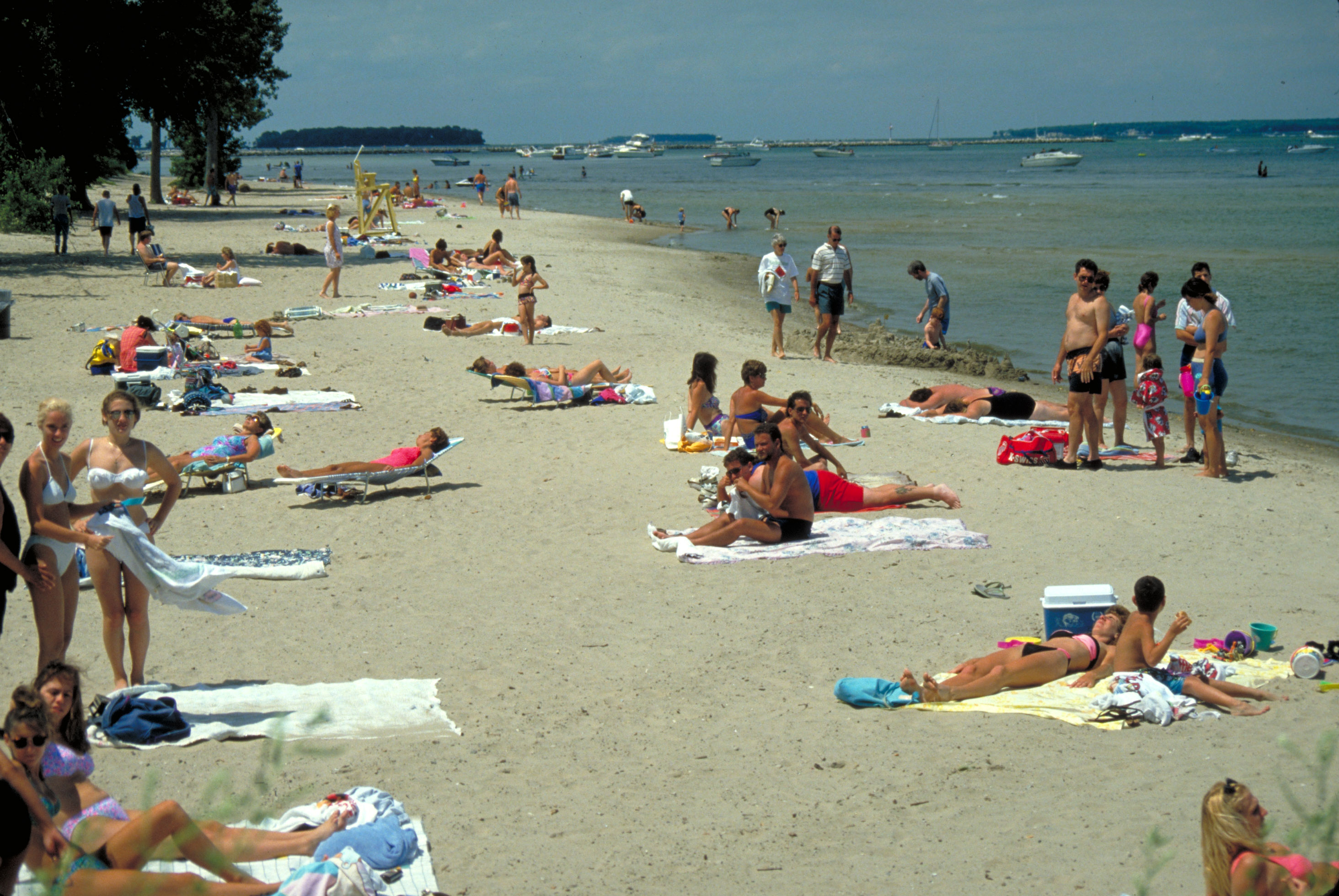
Who can do what at road-end beaches creates conflicts between private property owners and the public. Photo: EPA.
The latest speed bump in a decades-long Michigan struggle over who gets to toss a Frisbee on a Lake Michigan beach may soon be over. But it’s far from the end of the road.
At issue is a popular stretch of shoreline where 121st Ave. meets the water in Ganges Township, Mich., about 40 miles southwest of Grand Rapids. Waterfront property owners say they have exclusive rights to that sand. But nearby neighbors and members of the public have long been fighting for the right to play in it.
The 40-year struggle symbolizes growing conflicts throughout the Great Lakes over who can do what where a public road stops at a lake.
With more than 10,000 miles of coastal, inland and island shorelines, the Great Lakes have the most freshwater access in the world – at least, in theory. It takes a walkway, alley, park, easement, road or outright ownership of shoreline property to actually get to all that water.
When developers created subdivisions they had to make sure each lot had access to a road – a process called platting – to prevent landowners from having to trespass to get to their property.
In Michigan, many of these plats feature a lakeshore boulevard with roads ending at the water’s edge, resulting in dozens of road-end beaches.
Legal experts say the 121st Ave. beach battle is a landmark conflict.
“It raised the first case that deals with this particular issue in Michigan,” said James Nelson, an attorney who represents Ganges Township and public’s right to recreate.

The case has already set legal precedents.
An earlier appeals decision established the public’s right to gain legal access to Michigan waters and beaches not only because of use in the past, but also because a municipality has controlled and facilitated that use, said Jeff Jocks, another attorney on the public’s side.
After a decades-long struggle involving several parties, courts and judges, the public earned the right to toss a Frisbee in 2008.
But the battle is far from over. The neighboring property owners appealed the latest ruling.
The Michigan Court of Appeals sent the case to the Allegan County Circuit Court, which held a trial last month; lawyers submit final arguments this week.
The judge should make a decision by late-August or early-September, Nelson said.
To win, Nelson has to prove that the township controlled and facilitated recreation on the beach for more than 15 years. The battle could go on until all appeals have been exhausted.
“We intend to pursue litigation until it’s completed in our favor,” he said.
Other Michigan townships are watching.
“There are a lot of road ends up and down Lake Michigan having a similar situations,” Nelson said.
The Tiltons and their attorney, Andrew Mulder, declined to comment.
The struggle between private property owners and the public comes from the expectation that road ends will never be developed, said William Carey, a Michigan attorney who isn’t involved in this case but represents other waterfront property owners seeking ownership of public access sites.
“Landowners will like to see their right of privacy protected. Now, in more recent times, there’s greater demand for public access. That’s where the conflict arises,” said Carey, who recently wrote about the issue for the Michigan Bar Journal.
The cause of road-end conflicts is often a two-way street, said Chris Shafer, a professor at Cooley Law School in Michigan.
“Members of the public may abuse the right of public access and can generally create a nuisance,” he said. “[Waterfront] owners are commonly making issues and trying to shut out the public.”

Photo: Johan Larsson (Flickr)
The problem isn’t confined to Michigan.
“There’s litigation all over the states and numerous cases of issues arising at road ends,” Shafer said.
The tight squeeze at access sites along inland lakes have property owners throughout the Great Lakes region concerned about overcrowding at road-end beaches. A Minnesota official sees more and bigger boats contributing to congestion in his neck of the woods.
And lately, Wisconsin legal experts worry about loopholes that make it easier for public access sites at road ends to end up in private hands.
The problem is that people don’t know what their rights are at public access sites, Shafer said
“We are blessed with a lot of public access, but there are stretches where there’s an awful lot of exclusive private ownership,” he said. “Road ends are only points of limited access.”
FOX17 VIDEO: Beachfront Debate Goes to Court (2009)
E ditor’s note: This is part of an occasional series on Great Lakes public beach access at road ends.
ditor’s note: This is part of an occasional series on Great Lakes public beach access at road ends.
